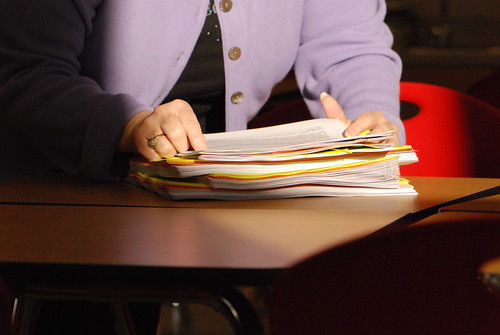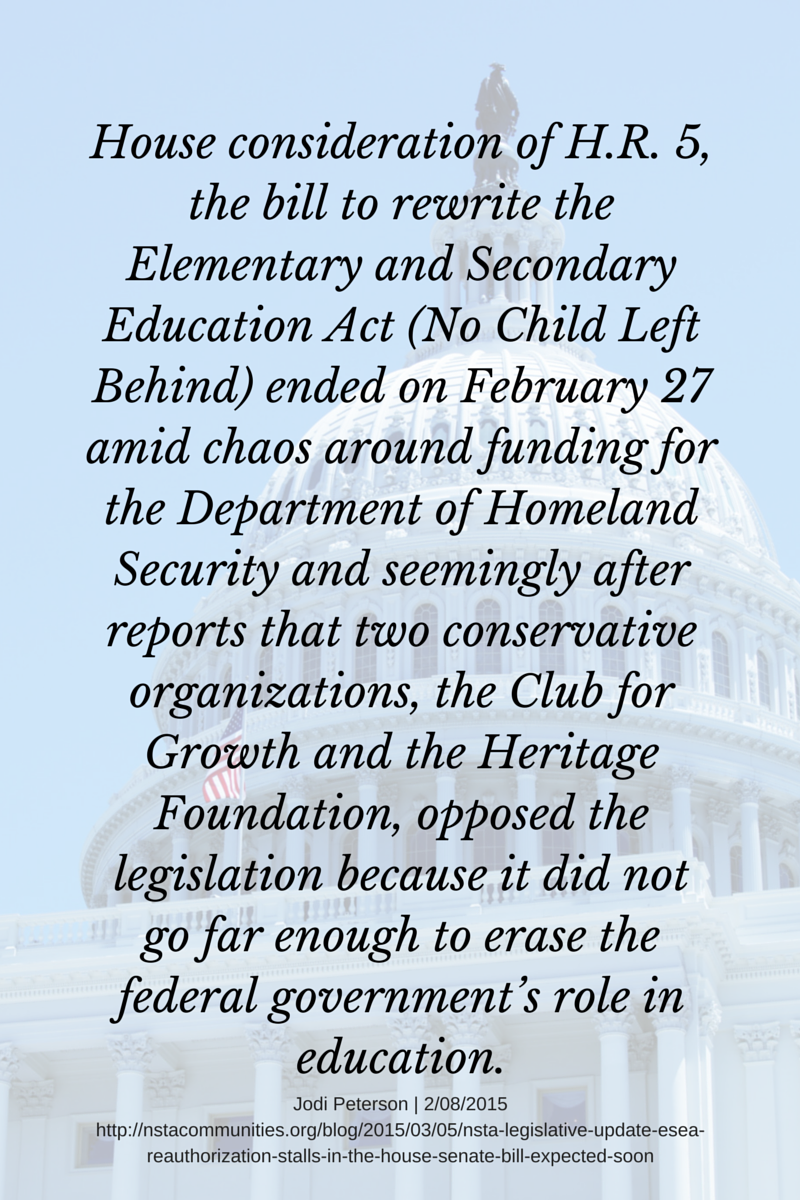Avoiding burnout and staying positive
By Mary Bigelow
Posted on 2015-03-05
 I’ve taught Earth Science for 10 years and I like my students and what I’m doing. But sometimes I feel overwhelmed and frustrated. Is this normal? How can I avoid burnout and stay positive? —R., Washington
I’ve taught Earth Science for 10 years and I like my students and what I’m doing. But sometimes I feel overwhelmed and frustrated. Is this normal? How can I avoid burnout and stay positive? —R., Washington
This dilemma came up at a recent event I attended. Most teachers identified with how you feel. One teacher remarked that when he started teaching 20 years ago, teachers were dealing with many of the same issues that we’re dealing with today—increased demands on our time, fewer resources for science, competition from students’ jobs and extracurricular activities, “lazy” students, helicopter parents or parents who don’t seem to be involved, administrators who don’t understand science teaching, the influence of standardized testing, and a lack of respect for teachers. He and the others agreed that a lot of burnout comes not from working with students but from unrealistic expectations and the influence of other adults. It’s not a comforting thought, but teachers have been overwhelmed for years!
We want to do whatever we can for our students but sometimes forget to do things for ourselves. By now you should have a good repertoire of teaching strategies and a comfort level with Earth Science content. If you’re doing schoolwork 24/7, it’s time to re-prioritize and focus on your health, your family, professional growth, and outside-of-school interests.
Here are some suggestions from our colleagues:
- Some unrealistic expectations are self-inflicted. It’s OK to cut back on things that are not essential to student learning, such as creating elaborate bulletin boards or busywork assignments for students.
- Put time for exercise on your calendar. Eat healthy and don’t skip meals.
- Surround yourself with positive people. If the faculty room is a den of iniquity, stay away. Share your planning or lunch period with a colleague or two and share ideas or divide some of the work. Or talk about something other than school.
- Students have one year of Earth science—you’ve already had 10 years of the course. Try a new theme or different big ideas each year to keep yourself from getting stale.
- Take advantage of social media, such as e-mail lists, blogs, discussion forums, Facebook, and/or Twitter for new ideas and resources, advice and suggestions, a few laughs, or a virtual shoulder to lean on. NSTA’s Social Media Dashboard is a good place to start.
- It’s hard for some teachers, but sometimes we have to blow our own horns. If you’re doing a good lesson, tell your principal about it, post a description on your class website, or send a note to parents
- Just as I have advised teachers just starting out in their careers, it’s important to guard your personal and professional time. If you hesitate to say no to a request from a principal because of time, your response could be “In place of what? If I do this, what can I take off my plate?” You don’t have to be on every committee or task force or coach multiple sports. Some teachers deliberately come to school early or stay late to complete their planning and paperwork, rather than taking things home with them.
- Keep a personal diary or journal. Write down the good things that happen each day and save any positive notes you get from students or parents.
- Maintain a professional rapport with your principal or other administrators. If you don’t complain about every little thing, when something important comes along, they might be more inclined to listen to you.
- Each month (or more frequently) set aside a “school-free” block of time. Visit a science museum or park, take a hike or bike ride, participate in sports, work on a hobby, attend a concert or lecture, read a novel, go to the movies—basically allow yourself some time to be a real person. Your family and friends will appreciate this.
Every teacher has had moments of frustration. I was often re-invigorated by attending a conference or working on a project with like-minded teachers. You are not alone, and you have a virtual community of colleagues to support you.
 I’ve taught Earth Science for 10 years and I like my students and what I’m doing. But sometimes I feel overwhelmed and frustrated. Is this normal? How can I avoid burnout and stay positive? —R., Washington
I’ve taught Earth Science for 10 years and I like my students and what I’m doing. But sometimes I feel overwhelmed and frustrated. Is this normal? How can I avoid burnout and stay positive? —R., Washington
Legislative Update
ESEA Reauthorization Stalls in the House, Senate Bill Expected Soon?
By Jodi Peterson
Posted on 2015-03-05
 House consideration of H.R. 5, the bill to rewrite the Elementary and Secondary Education Act (No Child Left Behind) ended on February 27 amid chaos around funding for the Department of Homeland Security and seemingly after reports that two conservative organizations, the Club for Growth and the Heritage Foundation, opposed the legislation because it did not go far enough to erase the federal government’s role in education.
House consideration of H.R. 5, the bill to rewrite the Elementary and Secondary Education Act (No Child Left Behind) ended on February 27 amid chaos around funding for the Department of Homeland Security and seemingly after reports that two conservative organizations, the Club for Growth and the Heritage Foundation, opposed the legislation because it did not go far enough to erase the federal government’s role in education.
As reported in earlier NSTA Legislative Updates, H.R.5 is the partisan Republican bill to rewrite the federal education law that would eliminate most federal education programs and allow states to determine funding priorities and how to help low income schools. The law also greatly restricts the powers of the Secretary of Education and allows portability for Title I funds. The bill was previously introduced by House Republicans and received no Democratic support. Chairman John Kline has said he would like the bill back on the House floor the week of March 16. The White House has issued a veto threat for the bill.
The House bill did pass the McKinley Workforce Critical Subjects amendment to H.R. 5 with support from both parties. This amendment was supported by NSTA and the STEM Education Coalition (although both groups do not support H.R. 5). Rep. David McKinley’s remarks can be found on Youtube– Part 1 Part 2.
In the Senate, Senator Lamar Alexander (R-TN), chair of the Senate HELP Committee, and Senator Patty Murray (D-WA), ranking Democrat on Senate HELP, are still working on big issues such as accountability and assessment in their efforts to craft a bipartisan draft for ESEA/No Child Left Behind reauthorization. Senator Alexander has indicated he would like to see a vote on an ESEA bill by April.
Here are two articles on the current situation.
- House Vote On ESEA Postponed To This Week (The National Law Review)
- Can an NCLB Rewrite Still Happen This Year? (Education Week)
Stay tuned and look for upcoming issues of NSTA Express for the latest information on developments in Washington, DC.
Jodi Peterson is Assistant Executive Director of Legislative Affairs for the National Science Teachers Association (NSTA) and Chair of the STEM Education Coalition. e-mail Jodi at jpeterson@nsta.org; follower her on Twitter at @stemedadvocate.
The mission of NSTA is to promote excellence and innovation in science teaching and learning for all.
Follow NSTA

